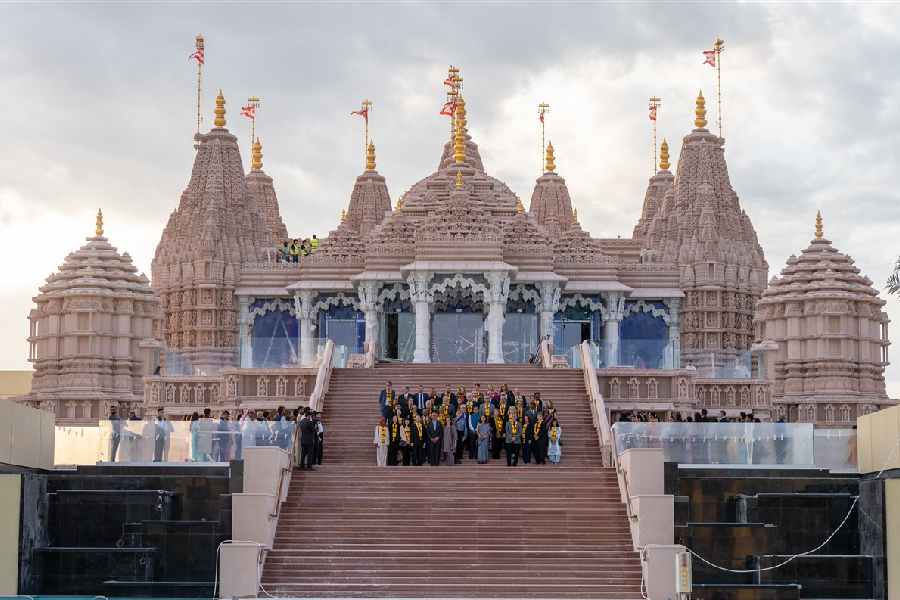Chiselling marble blocks and transforming those into intricate pillars and columns and idols of Hindu deities such as Lord Ram and Lord Ganesh for over four years, artisans in Rajasthan are beaming with pride as their craft has found a place in Abu Dhabi's first Hindu temple, set to be inaugurated on February 14.
The artisans from villages in Rajasthan's Makrana embarked on a creative journey in 2019 to bring the vision of the grand temple to life with their intricate sculpting, which continued even during the COVID-19 pandemic.
Ram Kishan Singh told PTI from Makrana, "I am a third-generation sculptor and we chisel stones to carve designs for a living. I was so excited about the idea of a Hindu temple in Abu Dhabi. What can be a better example to send a message of brotherhood and communal harmony? "I have worked on 83 pieces for the temple and what shape it has taken," he added.
The temple is being built by the BAPS Swaminarayan Sanstha on a 27-acre site in Abu Mureikhah, near Al Rahba off the Dubai-Abu Dhabi Sheikh Zayed Highway.
The temple's facade features exquisite marble carvings set against a sandstone backdrop, crafted from more than 25,000 pieces of stone by skilled artisans from Rajasthan and Gujarat. A substantial number of pink sandstone were transported from northern Rajasthan to Abu Dhabi for the temple.
"The choice of these stones, known for their durability against scorching temperatures reaching up to 50 degrees Celsius, reflects the practical considerations for the UAE's climate. Italian marble has been employed in the mandir's construction to ensure a touch of elegance," said Som Singh, a Rajasthan artisan who sculpted statues for the temple and later moved to the UAE to work at the site.
Noteworthy architectural elements include two ghumats (domes), seven shikhars (spires) that symbolise the seven UAE's seven emirates, 12 samrans (dome-like structures) and 402 pillars.
Within each shikhar, intricate carvings depict stories from the Ramayana, Shiv Purana, Bhagavatam and Mahabharata, as well as narratives of Lord Jagannath, Lord Swaminarayan, Lord Venkateshwara and Lord Ayyappa.
The 'Dome of Harmony' serves as a unique portrayal of harmony of the five natural elements -- earth, water, fire, air and space.
The camel -- a symbol of persistence, commitment and endurance -- has also been etched into the carvings while drawing inspiration from the landscape of the UAE.
"We have created intricate carvings using the finest white marble and pink sandstone that narrate stories from sacred scriptures. These elaborate pieces now serve as the temple's centrepiece. I saw a video from the day these were being placed at the site and jumped in excitement. I take immense pride that my creations will be on display for everyone to admire for ages," said Balram Tonk, a fifth-generation artisan.
Tonk and his brothers also worked on the new Ram temple in Ayodhya.
"It is the lords' blessing that our work is finding a place at these temples," he said.
Prime Minister Narendra Modi is scheduled to address "Ahlan Modi (Hello Modi)" -- the Indian community summit at Abu Dhabi's Sheikh Zayed Stadium on February 13. The following day, he is set to attend a dedication ceremony at the BAPS temple.
According to the temple authorities, 40,000 cubic feet of marble has been used to build the interiors.
Madhusudan Patel, the temple's construction manager, said, "Our journey during the construction has been a blend of innovation and overcoming challenges." "We have used heat-resistant nano tiles and heavy glass panels, merging both traditional aesthetic stone structures with modern-day functionality," he said.
Vishal Brahmabhatt, who supervises procurement and logistics at the site, said more than two lakh cubic feet of "sacred" stone has been transported in more than 700 containers for the temple's construction.
"Amid tough global challenges such as the pandemic and wars, this extreme task was possible only due to faith and collaboration. Transworld Group, DP World, Dubai Customs and Mundra port have been instrumental in transforming this daunting task into a reality," he said.
Except for the headline, this story has not been edited by The Telegraph Online staff and has been published from a syndicated feed.










